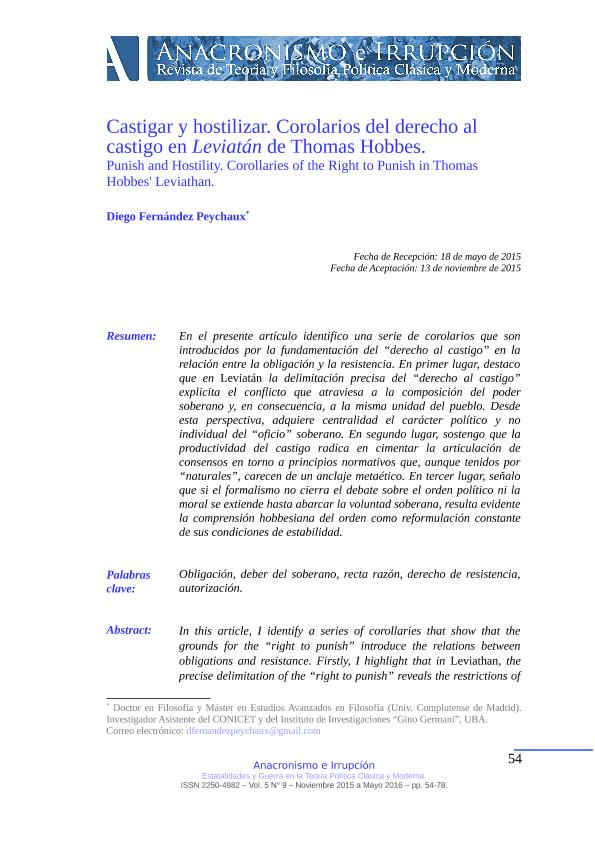Mostrar el registro sencillo del ítem
dc.contributor.author
Fernández Peychaux, Diego Alejandro

dc.date.available
2019-02-14T14:47:12Z
dc.date.issued
2015-11
dc.identifier.citation
Fernández Peychaux, Diego Alejandro; Castigar y hostilizar : corolarios del derecho al castigo en Leviatán de Thomas Hobbes; Universidad de Buenos Aires. Facultad de Ciencias Sociales. Instituto de Investigaciones Gino Germani; Anacronismo e Irrupción; 5; 9; 11-2015; 54-78
dc.identifier.issn
2250-4982
dc.identifier.uri
http://hdl.handle.net/11336/70144
dc.description.abstract
En el presente artículo identifico una serie de corolarios que son introducidos por la fundamentación del “derecho al castigo” en la relación entre la obligación y la resistencia. En primer lugar, destaco que en Leviatán la delimitación precisa del “derecho al castigo” explicita el conflicto que atraviesa a la composición del poder soberano y, en consecuencia, a la misma unidad del pueblo. Desde esta perspectiva, adquiere centralidad el carácter político y no individual del “oficio” soberano. En segundo lugar, sostengo que la productividad del castigo radica en cimentar la articulación de consensos en torno a principios normativos que, aunque tenidos por “naturales”, carecen de un anclaje metaético. En tercer lugar, señalo que si el formalismo no cierra el debate sobre el orden político ni la moral se extiende hasta abarcar la voluntad soberana, resulta evidente la comprensión hobbesiana del orden como reformulación constante de sus condiciones de estabilidad.
dc.description.abstract
In this article, I identify a series of corollaries that show that the grounds for the “right to punish” introduce the relations between obligations and resistance. Firstly, I highlight that in Leviathan, the precise delimitation of the “right to punish” reveals the restrictions of any capture of violence on the side of the “seat of power”. From this perspective, the political and non-individual character of the sovereign “office” becomes central. Secondly, I maintain that the productivity of punishment relies on founding the articulation of consents about normative principles which, even being “natural”, lack a metaethical basis. Thirdly, I note that if the formalism does not close the debate on the political order or the moral does not extends to cover the sovereign will, is evident the Hobbesian understanding of order as constant reformulation of its conditions of stability.
dc.format
application/pdf
dc.language.iso
spa
dc.publisher
Universidad de Buenos Aires. Facultad de Ciencias Sociales. Instituto de Investigaciones Gino Germani

dc.rights
info:eu-repo/semantics/openAccess
dc.rights.uri
https://creativecommons.org/licenses/by-nc-sa/2.5/ar/
dc.subject
Obligación
dc.subject
Deber del Soberano
dc.subject
Recta Razón
dc.subject
Derecho de Resistencia
dc.subject
Autorización
dc.subject.classification
Ciencia Política

dc.subject.classification
Ciencia Política

dc.subject.classification
CIENCIAS SOCIALES

dc.title
Castigar y hostilizar : corolarios del derecho al castigo en Leviatán de Thomas Hobbes
dc.type
info:eu-repo/semantics/article
dc.type
info:ar-repo/semantics/artículo
dc.type
info:eu-repo/semantics/publishedVersion
dc.date.updated
2019-02-12T18:14:57Z
dc.journal.volume
5
dc.journal.number
9
dc.journal.pagination
54-78
dc.journal.pais
Argentina

dc.journal.ciudad
Ciudad Autónoma de Buenos Aires
dc.description.fil
Fil: Fernández Peychaux, Diego Alejandro. Universidad de Buenos Aires. Facultad de Ciencias Sociales. Instituto de Investigaciones "Gino Germani"; Argentina. Consejo Nacional de Investigaciones Científicas y Técnicas; Argentina
dc.journal.title
Anacronismo e Irrupción
dc.relation.alternativeid
info:eu-repo/semantics/altIdentifier/url/https://publicaciones.sociales.uba.ar/index.php/anacronismo/article/view/1516
dc.relation.alternativeid
info:eu-repo/semantics/altIdentifier/url/https://dialnet.unirioja.es/servlet/articulo?codigo=5667688
Archivos asociados
